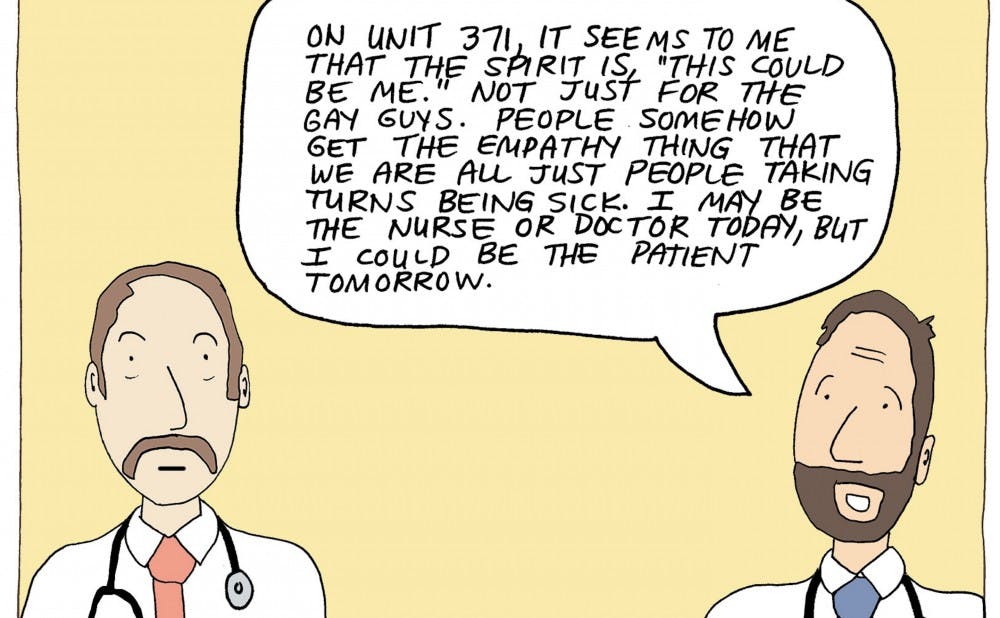There is no easy way to discuss death. Even when couched in pleasant language or harmless euphemisms, the topic is universally repulsive for its uncomfortable connotations, its alarming inevitability, its dreadful uncertainty. People do not want to talk about death, especially their own. However, in a world where medical advances have extended the arduous task of dying from a matter of days to years, death and the end of one’s life have become subjects that demand conversation. Fortunately for the students of Duke University, this is not an endeavor that has to be undertaken alone — three professionals are preparing to facilitate this difficult discussion in an interactive workshop that will likely be more enlightening than depressing.
“People don’t think, ‘How can a degree in English help me in medicine?’” said Professor Jehanne Gheith, one of the workshop’s three key speakers and the organizer of the event.
Gheith is well-acquainted with the complexities of end of life care: In addition to being an associate professor of Slavic Studies at Duke, she is a licensed social worker who has extensive experience with hospice. However, it is her background in Russian literature that she feels best equipped her for the challenging workshop.
“Stories about our lives and health help create meaning. … Humanities, stories and art all inform end of life medical care,” she said. Gheith’s paper, which will serve as the point of reference for her component of the workshop, explores how “novels, the humanities, and our relationships with our pets can contribute to better outcomes for people who are sick or suffering.”
Gheith's proficiency in literature has provided her with an additional dimension of insight into medicine, suffering and dying that most healthcare professionals lack. The use of stories to contextualize the end of one’s life is a seemingly simple method of coping that is often overlooked in favor of more logical, clinical approaches. While there is obvious merit to viewing the process of dying through a purely scientific lens, there are innumerable benefits to combining the humanities with the more technical aspects of end of life. This holistic perspective draws from art, poetry and literature to foster an environment in which death and aging can be honestly discussed and examined from a variety of angles to ease the transition from life to death.
“It means a lot to me, bringing my two professional worlds together,” Gheith said with an anticipative smile — she is clearly excited about the potential of this workshop to change people’s minds regarding the place of humanities in medicine.
The third speaker is MK Czerwiec, a nurse and cartoonist whose graphic novel “Taking Turns” has garnered praise for its intriguing exploration of the intersection between art and death during the 1980s AIDS epidemic. Czerwiec in particular brings a fascinating point of view to the end of life conversation, having worked as a nurse in an AIDS ward and experienced firsthand the power of marrying medicine and the humanities. Her passion for art allowed her to develop more meaningful relationships with her suffering patients and express herself in a healthy way when she ended up losing these same patients. “Taking Turns” is a cornerstone for the emerging field of graphic medicine, which utilizes art as a tool to craft engaging narratives about suffering and death. Czerwiec’s presentation of this topic will likely be just as intriguing, humorous and inventive as her graphic novel — perhaps even more so, given she will be sharing the stage with two fellow proponents of combining the humanities with end of life care.
When asked what she hopes Duke students will gain from the experience, Gheith replied: “I want people to start thinking about how [the end of life] can improve your life now, how it can improve any profession you pursue.”
The workshop promises to be more than just a brief glimpse into the world of dying — it will be an interactive, stimulating exploration of the facets of aging and how different narratives can improve the experience. It may not be easy or simple — the ethical minefield of end of life care is one of the most frustrating topics one can study — but it is necessary to start thinking about death now and decide how one wants his or her story to eventually end.
“Poems, Prose, and Panels: The Work of the Humanities in End of Life Care” will be held Saturday from 9:30 a.m. to 1:30 p.m. in The Edge Workshop Room in Bostock Library.
Get The Chronicle straight to your inbox
Signup for our weekly newsletter. Cancel at any time.

